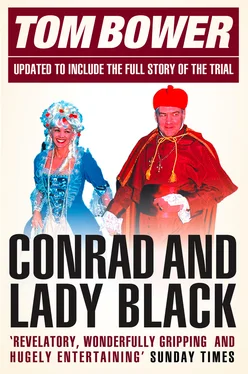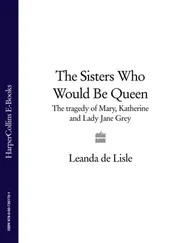Newman had been encouraged to cast his subject as an intellectual and a philosopher. ‘Every act must have its consequences,’ Black told Newman, posing as the profound historian who did not believe in redemption or atonement. 46 ‘Hal Jackman and I agree,’ he continued, ‘that we’re basically more Nietzschean than Hegelian.’ Black ‘revealed’ his sympathy with the ‘exquisitely sad comment by the seventeenth-century French satiric moralist Jean de la Bruyère that “Life is a tragedy for those who feel, and a comedy for those who think.”’ 47 Newman was encouraged to conclude, ‘He has trouble working out any form of understandable motivation for himself.’ Blessed with that smokescreen, Black’s disarming confession, ‘I may make mistakes, but at the moment I can’t think of any,’ was recorded without comment. 48 Despite Newman’s talent, several of Black’s fundamental flaws remained concealed. The cosmetics were impenetrable.
Initially, Black was delighted by the book. Reading his own interpretation of himself fed the conviction that journalists were easily beguiled. Self-interest, however, dictated that he maintain a chasm between himself and potential critics. The publication in Newman’s own Maclean’s of articles describing his Norcen troubles justified that caution. In 1983, fearing further allegations of dishonesty, he issued a writ for defamation against Newman and the magazine. His prosperity depended upon suppressing any objective examination of his fortune-hunting and perpetuating the myth of his being self-made, unblessed by any inheritance: ‘I’m rich and I’m not ashamed of being wealthy. Why should I be? I made all my money fairly.’ 49
In 1983 Black was, by the scale of his own ambitions, neither rich nor powerful. His gross wealth was about C$200 million, but most of that was used as collateral against loans. His debt was increasing, and he decided that he would sell Argcen’s (Argus’s successor) stake in Standard Broadcasting and Dominion Stores Ltd. Just as he had failed in mining and oil, so he had proved ineffectual at Standard Broadcasting, the owner of several radio stations, and Radler’s attempts to save Dominion had proved dismal. Newspapers, he agreed with Radler, were their best option. By slashing costs they could make profits, and newspaper ownership would satisfy his craving for political influence. His passion was to own the Washington Post , but more realistically he wanted Southam, Canada’s biggest newspaper chain. The owners, Radler spotted, had borrowed large sums to modernise and expand, but the business was deemed to be unprofitable. Only by making massive cuts would the group earn satisfactory profits. Black and Radler bought a small stake in the company, and made an offer wrapped around an uncongenial pronouncement. Southam, Black sneered outrageously, was run by long-haired, dope-smoking freaks left over from the 1970s. His offer to buy the company was rejected. Black was stuck. Frustrated by Canada’s politics and concerned about his image, he was aware of his shortcomings. ‘I’m a great believer,’ he had told Peter Newman, ‘in not becoming hypnotised by the rhythm of one’s own advancement. I have always felt it was the compulsive element in Napoleon that drew him into greater and greater undertakings, until he was bound to fail.’ 50
The ‘compulsive element’ was a characteristic Conrad Black shared with Barbara Amiel. Another common quality was living behind a mask. A third similarity was incompatibility with their spouses. After seven years of marriage the Blacks were irreconcilable, but were in mutual denial about their inevitable fate. Similarly, on 26 January 1985, Barbara Amiel also denied the obvious. Like Conrad Black, she had hoped that happiness would follow her marriage vows to the multi-millionaire David Graham. The expensive wedding party on the thirty-third floor of the Sutton Place Hotel, with a spectacular panoramic view of Toronto, was intended to seal her bliss. Instead, her itinerant search for permanence was doomed. Fate determined that Conrad Black should witness the beginning of her predicted disappointment.
*In an agreed swap of shares, Norcen bought 20 per cent of Hanna shares while Hanna sold its shares in Labrador.
THE ORIGINS OF A WOMAN later renowned as a ‘drama queen’ were remarkably ordinary.
In summer 1940, Barbara Amiel’s parents, middle-class Jews, moved from central London to Chorley Wood near Watford, north of the capital, to escape the Luftwaffe’s remorseless bombardment. On 4 December 1940, the day of her birth, the area around her grandparents’ homes in the East End was blazing. Among the subsequent victims of the incendiary bombs would be Isaac Amiel, her paternal grandfather, the owner of a sweet shop and an air raid warden.
Harold and Vera Amiel greeted their daughter’s birth with joy but understandable fear. The Blitz was the prelude to an anticipated German invasion, and if Britain was defeated, the fate of the country’s Jews was uncertain. Harold Amiel, a twenty-five-year-old solicitor, had joined the Buffs, the Royal East Kent Regiment, and was due to be posted to the 8th Army in North Africa. In his absence his wife Vera, a strikingly good-looking woman of twenty-four, could rely on her family: her sister Katherine, a doctor, and Harold’s three younger brothers and older sister Irene, had also left London. Several of them, including Harold and Vera, had settled in Chorley Wood.
In common with all their relations, Harold and Vera had been born in London’s squalid East End, but long before the outbreak of the war most of the Amiels and the Barnetts (Vera’s family) had escaped from the Jewish ghetto. The new generation, including a midwife, a doctor, a school teacher, an actuary, lawyers and businessmen, had abandoned regular attendance at synagogue and had consciously assimilated into British society. Although the Amiels stemmed from a well-known family of Sephardic Jews from Spain, and the Barnetts were descended from Vladimir Isserlis, an Ashkenazi scholar in Russia, Barbara and her cousins growing up in Chorley Wood were only vaguely aware that their family’s arrival in Britain had followed the discovery of great-grandfather Isserlis floating in the River Dnieper with a knife in his back. To escape the pogroms his widow had sold valuables to buy tickets on a boat sailing to Britain. Sixty years later, the fate of Europe’s Jews was rarely discussed in Chorley Wood. Rather, some families were preoccupied with persuading Britons to support the socialist or Communist parties in the next elections. Irene Amiel’s husband Bernard Buckman, the owner of department stores, was particularly close to two rich Jewish families, the Sedleys and the Seiferts. Together they championed and financed the British Communist Party. Barry Amiel, Harold’s younger brother, was also a member of the Communist Party. Among that group, Harold and Vera Amiel were known to be markedly uninterested in politics.
Vera was also noted as a neurotic, which caused tension during Harold’s return on leave in late 1942. Since their marriage in June 1939 the articulate and intelligent lawyer, now newly promoted as a major, had become disturbed by his wife’s emotions. That concern appeared to be brushed aside as he regaled his nephews and nieces with stories about the war and handed out epaulettes taken from captured Italian generals. The prizes from the battle-front would remain an indelible memory among the boys after they had bade Harold farewell on his return to Africa. In Harold’s absence his second daughter Ruth was born in 1943. One year later, Lieutenant Colonel Amiel’s war ended. Shot in the shoulder by a sniper while riding in a Jeep in Italy, he was repatriated as an invalid. Dressed in his colonel’s uniform, he spent time playing with his four-year-old daughter Barbara, who had struck up a close friendship with Peter Buckman, her older cousin. ‘Will you marry me?’ Peter asked Barbara. ‘We can’t,’ she replied. ‘We’ve both got dandruff, and that means that our children will be bald. I learned that in biology.’
Читать дальше












